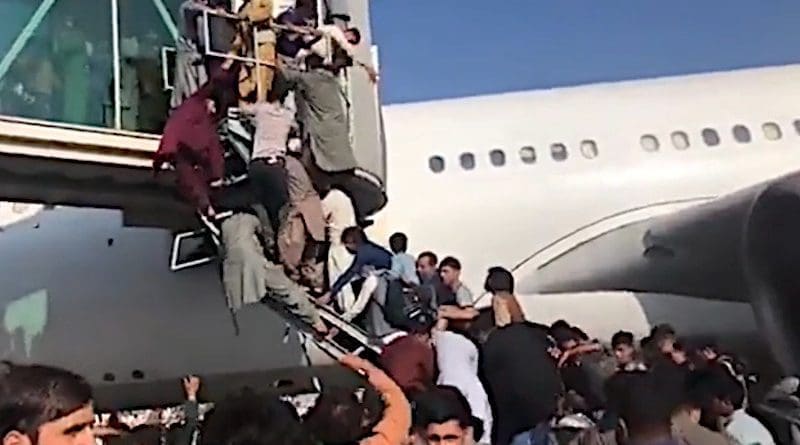US Intelligence Has Lost The Trust Of The People – OpEd
By Arab News
By Dalia Al-Aqidi*
The collapse of the Afghanistan government and chaotic US withdrawal from Afghanistan in August shed light on the capabilities of the American intelligence services. Security and terrorism experts are now trying to figure out what went wrong and why the CIA and its sister agencies failed to see what the Taliban had been building and planning for the past two decades.
We all remember when US President Joe Biden refused, during a press conference on July 8, to compare the evacuation from Afghanistan with America’s exit from Vietnam in 1975. “The Taliban is not… the North Vietnamese army,” he said. “They’re not remotely comparable in terms of capability. There’s going to be no circumstance where you see people being lifted off the roof of an embassy in… Afghanistan. It is not at all comparable.” However, photos of helicopters evacuating diplomats from the roof of the American embassy in Kabul were widely circulated the following month.
These images reflected the terribly inaccurate assessments that profoundly impacted the 46th US commander’s decisions and policy in Central Asia.
Fast forward a couple of months and the US is struggling with the most significant international embarrassment. It lost 13 servicemen and women at the hands of Daesh-Khorasan at Kabul airport and has been left with doubts about the capabilities of one of the most assertive global intelligence agencies.
Is the US any safer today? Apparently not, according to Colin Kahl, the Defense Department’s undersecretary for policy, who last week told the Senate Armed Services Committee that Daesh-Khorasan and Al-Qaeda could attack the US in as little as six months — and have the intention to do so.
“The intelligence community currently assesses that both (Daesh-Khorasan and Al-Qaeda) have the intent to conduct external operations, including against the United States, but neither currently has the capability to do so. We could see (Daesh-Khorasan) generate that capability in somewhere between six or 12 months,” Kahl told lawmakers, adding that it could take Al-Qaeda “a year or two.”
According to US officials, there are about 2,000 Daesh-Khorasan fighters currently in the Islamic Emirate of Afghanistan. They are considered a mortal enemy by the Taliban government; however, if Daesh-Khorasan decided to launch a terrorist attack against the West, the Taliban might not have the capability or will to stop it. And who would depend on or trust the radical ruling group?
Kahl reiterated to the members of the Armed Services Committee that the US will not depend on the Taliban to thwart terrorist threats emanating from Afghanistan, adding: “We would not count on the Taliban to be the ones responsible for disrupting that — we will have our own unilateral capabilities.”
We still do not know what capabilities Kahl was talking about, since Washington does not have agreements with Afghanistan’s neighbors to host troops for counterterrorism efforts. Frankly, they are not very friendly with the US.
During the hearing, several Republican members blamed the Biden administration for the mess Afghanistan is in, particularly as he rejected the suggestion of his own military advisers to keep at least 2,500 troops in the country to continue fighting terrorists and prevent any possible attacks against America or its global interests.
Sen. Jim Inhofe emphasized that, under former President Donald Trump’s plan, the US had agreed to withdraw troops only if the Taliban met seven conditions, including preventing Al-Qaeda from threatening the US from Afghanistan and denying residence to any group that poses that kind of threat. “These conditions weren’t met. In fact, as (chairman of the Joint Chiefs of Staff) Gen. (Mark) Milley told us, only one of the seven conditions was met. As we’ve heard in recent hearings, Al-Qaeda remains active in Afghanistan and will likely threaten the US homeland very soon,” Inhofe said.
The American people, who sent their parents, spouses and children to the war, have lost trust in their own intelligence agencies, since they do not really know what went wrong.
Did the intelligence community lie about what was happening on the ground to provide political cover for the Biden administration? Or did the administration know the truth and lie to them for Biden’s political gain? The last possibility is that the leading intelligence agencies were way off course, which puts the country at significant risk and encourages every terrorist group to act accordingly.
In order for the intelligence community to regain the trust of the people, the US’ allies and the international community, someone has to come clean and give a logical explanation. Otherwise, “Kabulgate” will haunt them for ever.
*Dalia Al-Aqidi is a senior fellow at the Center for Security Policy. Twitter: @DaliaAlAqidi

